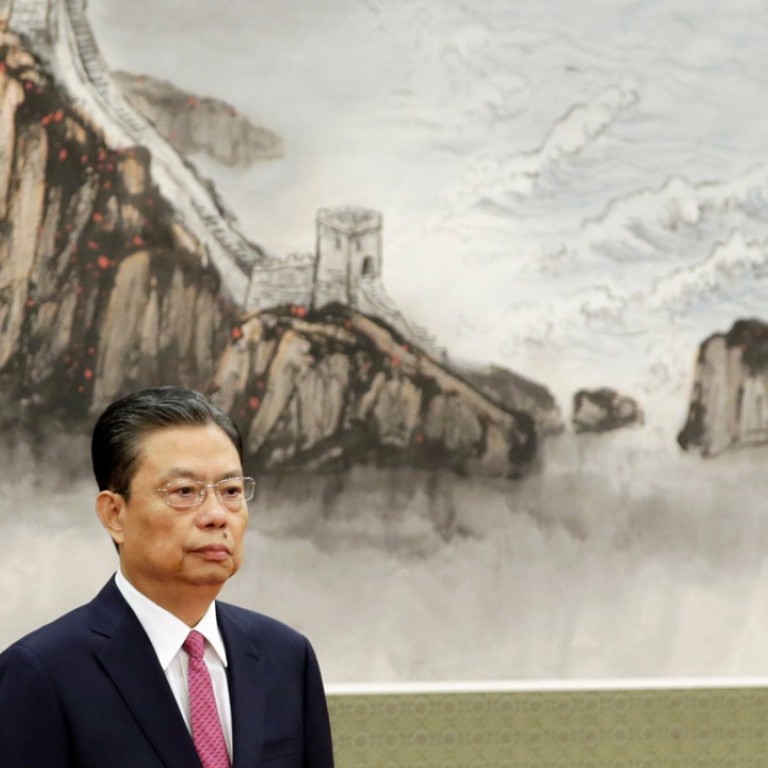
Higher profile for anti-corruption watchdogs as China’s graft-busters rise up the rungs of power
The man taking over from anti-corruption tsar Wang Qishan reaches the Communist Party’s inner circle while his deputies advance up the political ladder
China’s anti-graft tsar may be on the way out but the Communist Party’s discipline watchdog is expected to have a bigger role, with its new chief gaining a seat in the innermost circle of power.
The changes in the party’s leadership line-up will also pave the way for institutionalisation of President Xi Jinping’s anti-graft drive, further blurring the line between the party and the state.
Among the seven members of the Politburo Standing Committee introduced to the public on Wednesday was Zhao Leji, the man set to take over from Wang as head of the party’s Central Commission for Discipline Inspection (CCDI).
Supervision Minister Yang Xiaodu, one of Zhao’s eight deputies at the CCDI, was also elevated to the 25-member Politburo, a position neither of his two immediate predecessors attained in the position.
Three other Zhao deputies are one rung lower, becoming full members of the Central Committee. Those three are: Lieutenant General Zhang Shengmin, the top graft-buster with the People’s Liberation Army and a member of the Central Military Commission; Liu Jinguo, the man tipped to be the next supervision minister; and Justice Minister Zhang Jun.
Yang, 64, is tipped to be the vice-director of the new National Supervision Commission, a watchdog that will have expanded powers to root out corruption not just among party cadres but among all public servants, including judges, police officers and public school managers.
The party plans to set up an NSC-led network of supervisory commissions across the country once the National People’s Congress, the top legislature, endorses a new anti-graft law next year.
Bo Zhiyue, a New Zealand-based political analyst, said Yang would likely be the second-ranked person in the new body in charge of day-to-day operations.
His Politburo membership would allow him to better carry out decisions from the top, Bo said.
“The promotion shows the party is stepping up discipline enforcement,” he said. “No matter if the person is a party member or not, the supervisory commission can take action.”
Pilot schemes of the new system are under way in Zhejiang, Shanxi and Beijing, and when asked about them on Tuesday, Yang said: “[Everything goes] very well and very smoothly.”
Shanxi anti-corruption chief Ren Jianhua also said the system was more effective because it pooled the resources of the party and prosecutors.
Ren said that between April and September the number of people disciplined in Shanxi rose by 21.9 per cent year on year.
“The system has basically covered all public servants,” Ren said. “It has greatly strengthened the party’s leadership over anti-corruption work.”
In other appointments, two close Xi aides, Xu Lingyi and Li Shulei, were named CCDI deputy secretaries on Wednesday.
Xu worked under Xi when Xi was the party boss of Zhejiang province between 2002 and 2007.
Xu made headlines as a party inspector in February when he delivered the report accusing the Chongqing party committee headed by its then boss Sun Zhengcai of failing to eradicate the bad influence of the city’s disgraced former chief Bo Xilai and his right-hand man and police chief Wang Lijun.
Sun was put under investigation in July and was expelled from the party last month.
Li Shulei, 53, is the youngest top leader in the CCDI and has long been regarded one of Xi’s top advisers.
He was promoted to vice-president of the Central Party School in late 2009, around two years after Xi became its head.
But while Wang is leaving the CCDI, two subordinates during his time as Beijing’s mayor between 2003 and 2007 – Yang Xiaochao and Xiao Pei – were named deputies to Zhao at the powerful agency.
________________________________________


